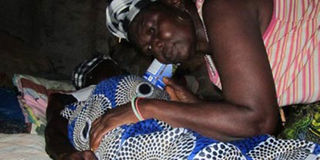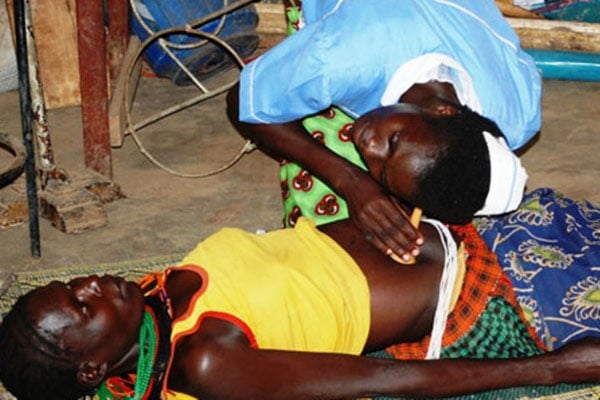How TBAs are failing HIV/Aids fight in Masaka

A traditional birth attendant cares for a pregnant woman. PHOTO/FILE.
Traditional Birth Attendants (TBAs) in Masaka District have been accused of being a stumbling block in the fight against HIV/Aids.
According to Ms Dympnar Nagawa, the Masaka District health improvement officer, babies being delivered by TBAs are at a higher risk of acquiring HIV/Aids.
“Some people have failed to understand that TBAs are not qualified to do the work they are doing. They operate in unhygienic conditions, which usually causes infections such as HIV and they cannot perform a caesarean section in case a baby is not lying properly in the mother’s womb,” she said during an interview on Saturday.
Ms Nagawa revealed that a study conducted by Masaka District health department together with Babies and Mothers Alive (BAMA) discovered that at least two babies in the last two months were found to be HIV positive. BAMA is an innovative partnership government created with districts aimed at transforming the quality of maternal, reproductive and new-born care in the country.
She said they discovered that these children had been delivered from TBAs. “Most TBAs do not have the capacity to test and even protect newborn babies from acquiring the virus from their mothers,” she emphasised.
Ms Nagawa also said men not only abandon condom use, one of the tools that prevents HIV/Aids spread, but also don’t support their wives to seek antenatal care from existing public health facilities.
“There is need to have men involved in the fight against HIV/Aids if Uganda is to attain the goal of ending HIV/Aids by 2030,”she said.
Ms Nagawa revealed that the HIV prevalence rate in Masaka has risen from 8.6 percent in the last five years to 10.5 percent.
Challenges
“As Masaka, we are still struggling at 89 percent of the second target of having all people found HIV/Aids positive on treatment,” she said.
“The people who know their HIV/Aids status but are reluctant to start treatment are affecting our efforts to attain the second 95 percent target,” she added.
Mr Dick Bugembe, the chairperson of Masaka Association of Disabled Persons Living with HIV/Aids (MADIPHA), said: “We appreciate the strategies put in place to fight HIV/Aids , but we need to do more to sensitise men about the dangers of not being part of the campaign against HIV/Aids.”
Mr Ponsiano Sserwadda, the general secretary of the Positive Youths Association, asked the government to expedite the process of approving the use of innovations added in the fight against HIV/Aids such as the injection, which, he says, may be more user-friendly than condoms.




